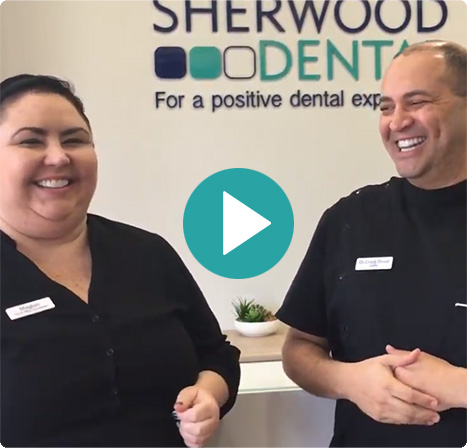TEEth Grinding Treatment Sherwood
Night-time Tooth Grinding and Jaw Clenching can have far reaching effects on your body and lifestyle.
Grinding your teeth at night
Dr Craig and Meghan chat here about their own splints they wear at night.
Bruxism is the involuntary grinding of teeth which often occurs during sleep.
Bruxism and clenching of jaw muscles affects more than one in six people and are commonly undiagnosed sleep problems.

When you grind, the force exerted on your teeth is many times greater than during chewing
In the early stages, mild wearing of teeth on the chewing surface may be noticed by your dentist.
Unfortunately, this can progress to:
- Wearing down of teeth
- Short teeth
- Ugly cracks
- Teeth chipped at the gum line
- Broken teeth
- Damaging or dislodging dental crowns
Grinding and clenching can also be a contributor to tooth sensitivity, gum recession and even loose teeth.
It’s more than just teeth that are at risk.
When the jaw and it’s joints are under these excessive forces, other symptoms can occur because the muscles are strained, fatigued and overworked… yes, even during sleep. This is when more significant symptoms can result, such as jaw discomfort progressing to face, neck and/or shoulder pain. This is known as TMD (temporomandibular joint disorder) which in turn can be responsible for a myriad of related problems.- Wearing away of the jaw joint (often noticed as popping and clicking of the jaw joint)
- Difficulty opening and closing
- Sore tired jaw
- Pain in jaw joints
- Headaches
- Migraines
- Ear aches
- Ringing in the ears
- Neck pain
- Facial pain
- Other sleep disorders
What can be done for tooth grinding?
Treatment depends on many factors. If stress if found to be a contributor, a variety of stress reduction techniques and in some cases, medication can relieve pain and reduce stress temporarily.
The goal of treatment is to protect the teeth from damage and to relax the jaw muscles, which in turn resolves or prevents many of the bruxism symptoms.
The most common treatment is the use of a splint. This is a thin plastic custom-made device, not unlike a mouthguard, that fits over your teeth and absorbs the forces caused by grinding. It is worn at night and offers the most effective and comfortable protection.
In some cases, missing, worn or misaligned teeth can actually be the cause of grinding and clenching. Dentistry can restore teeth, rebuild the bite and eliminate clenching and grinding. This can allow the jaw, neck and face muscles to relax.
Whatever the cause of bruxism, early intervention is needed to prevent damage to the teeth and to also help alleviate long term sleep problems and painful jaw, head and neck symptoms.
Important: If you know someone with a worn-down smile, facial or jaw pain or night grinding, please share this article.
Preventing the long-term consequences of grinding and relief of the related symptoms can be life changing and save on future dental costs as well.
Ask Dr Craig Duval
For more advice on bruxism or to order a protective custom-made splint, please contact our friendly team on 07 3555 7975.

